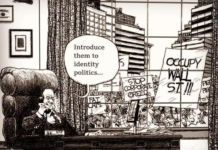
You may have heard Paul Goldsmith making claims about the number of jobs created so far from the Provincial Growth fund, not to mention how we need four lane highways up North rather than Maori land development and job creation investment.
A snapshot of the number of jobs in Wellington versus the number in the provinces under the Provincial Growth Fund is one thing at any given point in time – but using it to extrapolate a future rate of job creation is pure sophistry.
The same can be said about claims about four lane highways when they ignore altered traffic flows from proposed rail links that will carry much of the freight trucks have to bear at the moment – not to mention additional two lane highways provide four lanes of access anyway.
Sophistry surrounds Paul Goldsmith and has been his constant companion for many years.
You may not have heard about the link between Goldsmith and Don Brash?
As you know Don Brash – freedom of speech and equality campaigner for those who have never been colonised – had his words cut short the other day up at Waitangi by some Maori who reckoned there was no room for racism there.
Don Brash had been invited to Waitangi by Reuben Taipari, after reading his autobiography.
Part of that autobiography refers to Don’s version of events back around the time he ( and National ) jumped 17 points in the polls by delivering a divisive race baiting speech at Orewa.
Not many people know Paul Goldsmith had a hand in reviewing that very speech before it was delivered.
Yes he looked it over and made some changes, some of his lines were kept.
Paul Goldsmith also wrote Don Brash’s biography and the text pleased Don so much that Don remarked :
“I do not have a single word I would change”.
Here is what Wikipedia has to say about these events :
“At the launch of the Don Brash biography, Brash: A Biography, Goldsmith assured Danya Levy of the New Zealand Press Association that the book “was not commissioned by the National Party” and that it was his own initiative, but written with Brash’s co-operation.
But as investigative journalist Nicky Hager in his book The Hollow Men revealed, it was indeed commissioned by the National Party, and was in fact the party’s first big budget item in the 2005 election campaign.”
Yes Paul Goldsmith was telling us what he thought he might get away with – until that pesky Hager came along and exposed he was full of shit.
Wikipedia goes on to say :
“Hager quotes a 21 May 2004 email from Brash to Richard Long, who was his chief of staff, where a proposal from Christchurch publisher Willson Scott for the biography was discussed. Long replied two days later that he had discussed the book with Goldsmith, and Brash in reply wanted political historian Michael Bassett (a personal friend of Brash) to be considered.
The book was eventually commissioned with Goldsmith, and was paid for by National Party donors through a company called Silverbeat, which belonged to Brash’s assistant Bryan Sinclair.
National Party staff supplied Goldsmith with a collections of papers for the book, and Goldsmith first interviewed Brash in July 2004.
Within weeks, Goldsmith supplied the first drafts to National Party staff, and the book was written in such a complimentary way that Brash commented on the final chapter: “I do not have a single word I would change”.
The working relationship with Brash got so close that Goldsmith even got to review a draft version of Brash’s second Orewa Speech (dubbed Orewa 2); Goldsmith returned his draft to Brash on 10 November 2004, and some of the lines were kept for 25 January 2005 speech delivery.
Michael Bassett also sent Brash a rewritten version of the speech on New Year’s Eve.
‘Don, I’m sorry it has taken so long, but I re-typed that draft and made it a little more political.’
According to Hager this was an understatement.
Bassett had added inflammatory phrases about beneficiaries ‘ripping off the system’, using ‘stand-over tactics’ to get benefits and welfare policy being ‘the most destructive aspect of the political correctness that Labour would engulf us in’ – phrases that made their way into the final speech.
Hager went on to write :
“Some of Bassett’s other ‘more political’ language did not make it to the final version. His accusing descriptions of a ‘dependency army’, ‘bludging off the rest of us’ with its DPB and beneficiary ‘rip-offs’ were later removed by the woman-voter-sensitive Keenan and the increasingly uncomfortable welfare spokesperson Katherine Rich. Bassett’s vitriolic characterisation of ‘politicians and others in the welfare industry whose careers depend on farming the problems of the disadvantaged’ made it through many drafts before being dropped a week before the speech was delivered.”
Notably Goldsmith’s contributions came before Basset’s so he cannot be blamed for that – but he was right there in the spirit of it all.
Goldsmith was also mixed up in others creating false appearances about the independence of his authorship.
Something Goldsmith in the end decided to ignore which is good I suppose.
Wikipedia notes :
“Whilst the book was under production, Brash’s team of advisers strategised how the biography could be used to best effect, or “as a significant marketing tool”, as Brash himself called it in a 27 March 2005 email.
To give the impression that the book was independently written was made more complicated by Goldsmith becoming a candidate in the Maungakiekie electorate during the book production, something that Long had advised against by stating that he had “warned the party and Goldsmith months ago that his candidacy would undermine the authority of the book and urged him to hold off till next time.”
Goldsmith had a go anyway but was defeated by Labour and he was too low on the list to get into parliament just yet.
It is worth mentioning that Don Brash – fearless champion of Free Speech tried his hardest to put an injunction on the free speech in Hager’s book – “The Hollowmen” – which blew the lid on what was really going on behind the sophistry.
Not only that but Don is less keen on free speech in Te Reo than in Chinese as he sits as chair of the Industrial and Commercial Bank of China.
But back to GoldSmith.
It took till 2011 before Goldsmith surfed into parliament as a list MP, and he eventually became a cabinet minister holding the portfolios of Science and Innovation, Tertiary Education, Skills and Employment, and Regulatory Reform.
Goldsmith showed a great interest in furthering innovation funding between New Zealand and Israel prior to the 2017 election – but the money for this was played down by Gerry Brownlee.
Israel was busy getting in on new ideas all around the globe and had similar agreements in progress in other Western nations.
Keeping up with change and capitalising on opportunities and other people’s ideas.
That’s understandable but what about having to share the rights to our own bright ideas?
The other day Goldsmith was bleating that the goal of planting 1 Billion trees should not have included a contribution from the private sector after Shane Jones heralded that we might actually plant 1.4 Billion over ten years not just 1 Billion as is the goal in the coalition agreement.
In November 2017 Shane Jones and Labour were both clear that the 1 Billion trees would be a joint effort between government and the private sector…and there was never any promise it would all be achieved via government alone.
But Goldsmith wanted to persuade the public of some other narrative, like this was a broken promise blowing in the wind.
Taken together – there’s far too much sophistry surrounding Goldsmith, polishing bad apples in biographies, fibbing about who commissioned Brash’s book, adding to divisive speeches, giving away our innovations, making up fake projections about jobs, dismissing the need for Maori land development and claiming broken promises based on thin air.
I’d be skeptical about anything such a person claimed.






One look at the man tells me he is a fake. A lot like key.
Goldie is not one of the smartest kids on the Block
Goldie is being groomed for greater things
“for those who have never been colonised”
Really?
Who, today, is ‘colonised’ in this country? The word “today” is important in this context.
When people from this country go to Australia to settle and take advantage of the opportunities in a new place – do they form colonies? For comfort, solidarity and familiarity, of course. Do they ‘respect’ the indigenous people; or do they unconsciously pick up the mainstream local attitudes?
Further, of all the people from all the different countries of the world who now live here – which ones DON’T come from a place that has been colonised in the near or distant past? Which cultures haven’t borrowed from other cultures when they came to see some value they could adopt?
And can anyone actually say how to move through, then on, from this apparently devastating situation? Or is there some intrinsic value in holding on to this limiting excuse?
Bloody well said there Otto 100% to Gerard Otto.
Here is what we though and sent to Labour coalition today.
It mirrors your thoughts exactly.
Citizens Environmental Advocacy Centre Incorporated (CEAC) Est’ 2001.
PO Box 474. Napier.
Protecting our environment & health.
In association with other Community Groups, NHTCF and all Government Agencies since 2001.
CLIMATE CHANGE SPECIAL EDITION.
• Health and wellbeing.
• East Coast Transport Project.
TO;
Hon Phil Twyford – Minister of Transport.
Hon’ Jacinda Ardern PM.
Hon Winston Peters. Deputy PM.
Hon’ James Shaw. Minister for climate change
Hon’ Shane Jones. Minister of Regional Development.
Hon’ Grant Robertson. Minister of Finance.
Hon’ Andrew Little. Minister of Justice.
Hon’ Stuart Nash. MP For Napier Wairoa/ Matawai regions.
Hon’ Megan Woods. Minister of Energy.
URGENT PRESS RELEASE; – ACTION NEEDED HERE BY – Transport Minister Twyford.
10th February 2019.
Dear Ministers, Local civic authorities & rail stakeholders,
Subject today. “Simon Bridges on 24th September 2018 last year on News hub said he now wants to work with Jacinda on climate change”
CEAC have no reasons to believe that Simon Bridges will reverse his “anti-rail – pro-road freight policies”
SCOOP PARLIAMENT
Media press release from CEAC
Sunday, 10 February 2019, 8:34 am
Press Release: Citizens Environmental Advocacy Centre
“Simon Bridges on 24th September 2018 last year on News hub said he now wants to work with Jacinda on climate change”
https://www.newshub.co.nz/home/politics/2018/09/simon-bridges-jacinda-ardern-working-together-on-climate-change-plan.html
Quote;
“Simon Bridges says he and Jacinda Ardern have been working behind the scenes to develop an “enduring” plan to combat climate change.
He told The AM Show on Monday he’s had one private meeting with Ms Ardern, and National climate spokesman Todd Muller has met several times with Climate Change Minister James Shaw.
“We talked about whether we can have an enduring framework that everyone signs up to. That’s a different thing from saying ‘the target will definitely be this and we need to do those seven things’.”
Unquote;
We at CEAC say this is an un-believable change in Simon Bridges position, he has shown today on News hub as Bridges has been part of the effort to shut down our rail system and push all freight onto our roads that will increase the climate emission gasses five times faster.
We need rail services to be fully restored to HB/Gisborne now.
Rail according to this report will save us $1.5 Billion a year and cut climate change emissions according to a rail study his Government produced back in 2016 and kept under wraps when he found out the truth in his report his government had ordered in 2016.
From his report we quote;
“Reducing carbon emissions by 488,000 tonnes a year – the equivalent of taking 87,000 cars off the road – saves $8.5 million.”
http://www.kiwirail.co.nz/uploads/Publications/The%20Value%20of%20the%20Rail%20in%20New%20Zealand.pdf
Facts at a glance:
• Rail contributes up to $1.5 billion in often unseen benefits to New Zealand each year.
• The value of rail to New Zealand far outweighs its cost to the taxpayer.
• Using rail reduces the number of deaths and injuries on our roads by a net 271 a year.
• Rail saves taxpayers money on congestion, road maintenance costs, injuries and fatalities and reduced carbon emissions.
Reducing congestion saves $1.3 billion, the equivalent of 100,000 fewer daily car trips and taking 30,000 trucks off the road for an hour a day.
• Reducing carbon emissions by 488,000 tonnes a year – the equivalent of taking 87,000 cars off the road – saves $8.5 million.
• Improving safety outcomes saves $60 million.
• Reducing road maintenance saves $63 million.
• Rail is also an important and sustainable economic contributor to the regions and links New Zealand to export markets overseas.
We at CEAC have no reasons to believe that Simon Bridges will reverse his “anti-rail – pro-road freight policies” in an attempt to help in reducing carbon emissions by at least 488,000 tonnes a year or more by increased use of rail freight to lower all those carbon emissions, unless we see solid evidence of this move back to restoring rail freight written in policies by him laid out before the voters of NZ.
Next subject; artlce today 7/2/19 More “dangerous and unpredictable” weather warning – Hon’ James Shaw.
Our letter to you on 11th December 2018, (see below) now needs to remind you of the lack of our HB/Gisborne ‘Rail infrastructure restoration needed to lower transport carbon emissions’ as the Minister is requesting we do.
HBRC/Napier Port CEO now has said in eight years truck freight to Napier Port will increase (quote) “Napier Port’s CEO Todd Dawson said it was projecting an increase in traffic of 187 per cent over the next eight years.”
“Hawke’s Bay’s thriving economy means cargo volumes are increasing, leading to growing numbers of truck coming to Napier Port.
In May 2018, Napier Port submitted to the Regional Land Transport Plan Review, including:
“…growth in key freight types through the Port will increase truck movements (in and outbound) by 187% (being 171,000 truck movements), along the critical Ahuriri Access corridor, in the ten years to 2027.”
Napier Port.
http://www.scoop.co.nz/stories/AK1902/S00173/napier-port-projecting-187-per-cent-increase-in-traffic.htm
Now you know that Napier Port are expanding truck freight that is damaging our environment and our residential health wellbeing and loss of our amenity values (RMA under 7 and 31.
See (below) what the Climate Minister is telling us all to observe, so we request you stop Napier Port expanding truck freight and you need to fund restoration of our broken railway and fund mitigation for adversely affected residents also.
Thursday, 7 February 2019, 10:33 am
Press Release: New Zealand Government
The Minister for Climate Change has welcomed new New Zealand-led research that warns of more “dangerous and unpredictable” weather in the future if the world doesn’t get more serious about climate change action.
“This research explores what could happen with ice melts occurring at both polar caps and paints a disturbing picture of what our world will be like if we fail to act,” says James Shaw.
“It is research like this that emboldens me in my work on the Zero Carbon Bill. I can proudly say we are working as hard as we can to ensure our kids and grandkids have a healthy planet to live on.
“Today’s findings from Victoria University and GNS Science and their international associates puts further evidence on the table that policies around the world need to match what science is showing us. Kids around the world are already rallying in their community and crying out for it.
“Future generations are at the mercy, or benefit, of policies we’re putting in place today. So those policies need to take account of the clear warnings which reports like ‘Global environmental consequences of twenty-first-century ice-sheet melt’ are giving us.
“I appreciate the valuable work this research provides, with its new understandings around the very real risks global warming’s impact on Earth’s polar ice caps presents – especially for vulnerable coastal countries like ours.
“It strengthens my commitment to help see New Zealand do what it can to be part of the solution,” says James Shaw.
low rail funding still exist in HB/Gisborne regions compared to other regions stalling our rail infrastructure repairs/upgrades.
Dear Shane and Phil, and rail stakeholders,
Please review the press release here below today please, on our current state of our efforts to restore the Napier ‘north line’ to Wairoa ( and later to Gisborne is stalled.)
Facts;
• HB section of rail maintenance/upgrades deserves more than a paltry $5n million for all the HB rail Networks of our rail system that reaches over 350 kms to the south border of Manawatu at Woodville.
• Especially when we saw Government (past and present) shell out ‘multi millions’ on other regions such as shown on this list;
1/ Matawatu rail – in December 2018 Shane Jones announces $40 million for a rail freight inland port in Palmerston North.
2/ North Port rail. August 2018. Over 450 Million dollars for rail connection.
2/ Wairarapa rail – in October 2018 43 Million for restoring the line from Masterton to Wellington.
3/ Kaikoura main south rail – PM Jacinda Ardern announces a $40 Million dollar upgrade to tourism/rolling stock/services.
5/ Midland rail Otago $15 million for a limited length of track damaged with bridges in a scrub fire in 2016.
6/ Kaikoura rail south from Picton to Christchurch. $900 million and still more to come.
7/ (The lowest financial contribution given to any province) HB $5 million to repair the Wairoa line (prior to the latest slip at Raupunga caused by a storm in July 2018.
Your government followed blindly behind the last Government ‘National’ after the wellington earthquake that closed the port of wellington freight terminals, and chose to trucking all “Port of Wellington freight to Port of Napier by road.
You owe us a ‘carriage of care and mitigation’ here because of the environmental effects placed on our residential communities under the RMA caused by the Government re-routing freight handling around our ports and is negatively loading of the Wellington Port freight now being only road freighted to Port of Napier.
This issue needs to be ‘mitigated’ to the satisfaction of those affected residents,
• with noise barriers
• residential lower speed levels
• with signs warning to drive slow to respect the residential communities,
• speed cameras to “calm traffic in residential
• noise sensitive zones signs
• and smoother road surfacing to lower both noise and tyre dust road pollution measures
• all must be given to all Napier residents now facing truck 24/7 freight to Port of Napier.
• Mandatory fitting of “Donaldson ‘silent partner’ Muffler systems (many other countries make it mandatory for heavy transport to have if operating through residential regions) such as Napier is. https://www.ryderfleetproducts.com/donaldson-m101181/5-muffler-silent-partner-p-w26-m101181
• Tree belts and earth berms where possible.
Those road freight moves are now heavily impacting on our communities here in Napier from Wellington, since it is now causing us massive truck gridlock on our roading and rail should and urgently needs to be repaired to ‘take that freight off the roads’ in line with your stated goal of lowering the transport climate change emissions that the current kiwi rail manager in the article said rail will achieve.
https://www.nzherald.co.nz/business/news/article.cfm?c_id=3&objectid=12174329
Quote KiwiRail chief operations officer Henare Clarke “Taking logs to the port (of Napier) by rail will reduce carbon emissions, take trucks off the road and provide an efficient service for forestry owners.”
HB and Gisborne need better government financial investment in rail as other regions are now receiving so why do the people of HB/Gisborne fell ‘disowned’ by the new “inclusive Labour/NZF Government?
The facts show now clearly that ‘a low investment in rail infrastructure’ is on show here from your government and is clearly the reason for our regions on the east coast of NZ are feeling abandoned.
Please return the our HB/Gisborne regions and invest in rail not roading as we need this as other regions do.
Gisborne Mayor Meng Foon sent an email to Kiwi rail on June 15TH 2018 asking them to restore rail services to Gisborne.
We have a copy of that email Meng Foon sent to us following our meeting with him, then he had sent it to the CEO of kiwi rail at that time. (Copy is available on request
Your response to our requests is kindly requested.
Citizens Environmental Advocacy Centre Incorporated. (CEAC.)
Subject: Napier-Wairoa rail line washout repair and reopening on track … (“Hawke’s Bay Today”):
https://www.nzherald.co.nz/business/news/article.cfm?c_id=3&objectid=12174329
Napier-Wairoa rail line washout repair and reopening on track
11 Dec, 2018 6:01am
By: Doug Laing
Doug Laing is a reporter for Hawke’s Bay Today
doug.laing@nzme.co.nz HawkesBayToday
KiwiRail has dismissed rumours of further delays in the reopening of the Napier-Wairoa railway line and hopes work on a troublesome washout will be completed within about four months.
Responding to rumours that some work-gang access was being limited by landowners, acting KiwiRail chief operations officer Henare Clarke told Hawke’s Bay Today: “Work on repairing the washout at Raupunga is proceeding well, and the adjacent property owners have been proactive and supportive of that work.”
“There have been no delays in gaining access to the site where the work is taking place,” he said.
He said KiwiRail chose to publicly notify the work across the common boundary. The process had been completed and did not raise any concerns or issues, he said.
KiwiRail still expects the work to be completed in April next year, putting the reopening of the line about four months behind the provisional target set last February.
The Government had announced a $5 million boost from the Provincial Growth Fund to get the line open again to meet transport demands from the so-called Wall of Timber from northern Hawke’s Bay and east coast forestry harvesting over the next few years.
The line was “mothballed” by Government-owned KiwiRail in October 2012, six months after a washout near Waikokopu closed the Wairoa-Gisborne sector.
But plans for reopening the line between Napier and Wairoa hit another snag with a washout after heavy rain in the first week of September.
Forty-five metres of track was left swinging in the air near the Maungaturanga Viaduct, north of the State Highway 2 and railway township of Raupunga.
Clarke said in October a detailed assessment of the site showed it was a more complex situation than initial inspection indicated, and fixing the slip would delay the reopening of the Wairoa to Napier line.
KiwiRail’s preferred option was to rebuild the embankment, removing a significant volume of slip material and backfilling on the site.
“While this setback is unfortunate we remain committed to reopening the rail line for forestry,” Clarke said at the time.
He added it was working with other stakeholders and forestry owners to see if there were other options for rail freight while work continued at the washout.
“September’s event will not stop what is an important freight connection for the region,” he said.
“Taking logs to the port (of Napier) by rail will reduce carbon emissions, take trucks off the road and provide an efficient service for forestry owners.”
Goldsmith, the “Clayton’s” National candidate in Epsom. He who ripped up campaign billboards promoting his electorate candidacy because National was gaming the coat-tail provision of MMP and attempting to get ACT into Parliament throughbtge back door. So Goldsmith was campainjng only for the Party Vote not the electorate vote, despite being an ELECTORATE candidate.
Comments are closed.